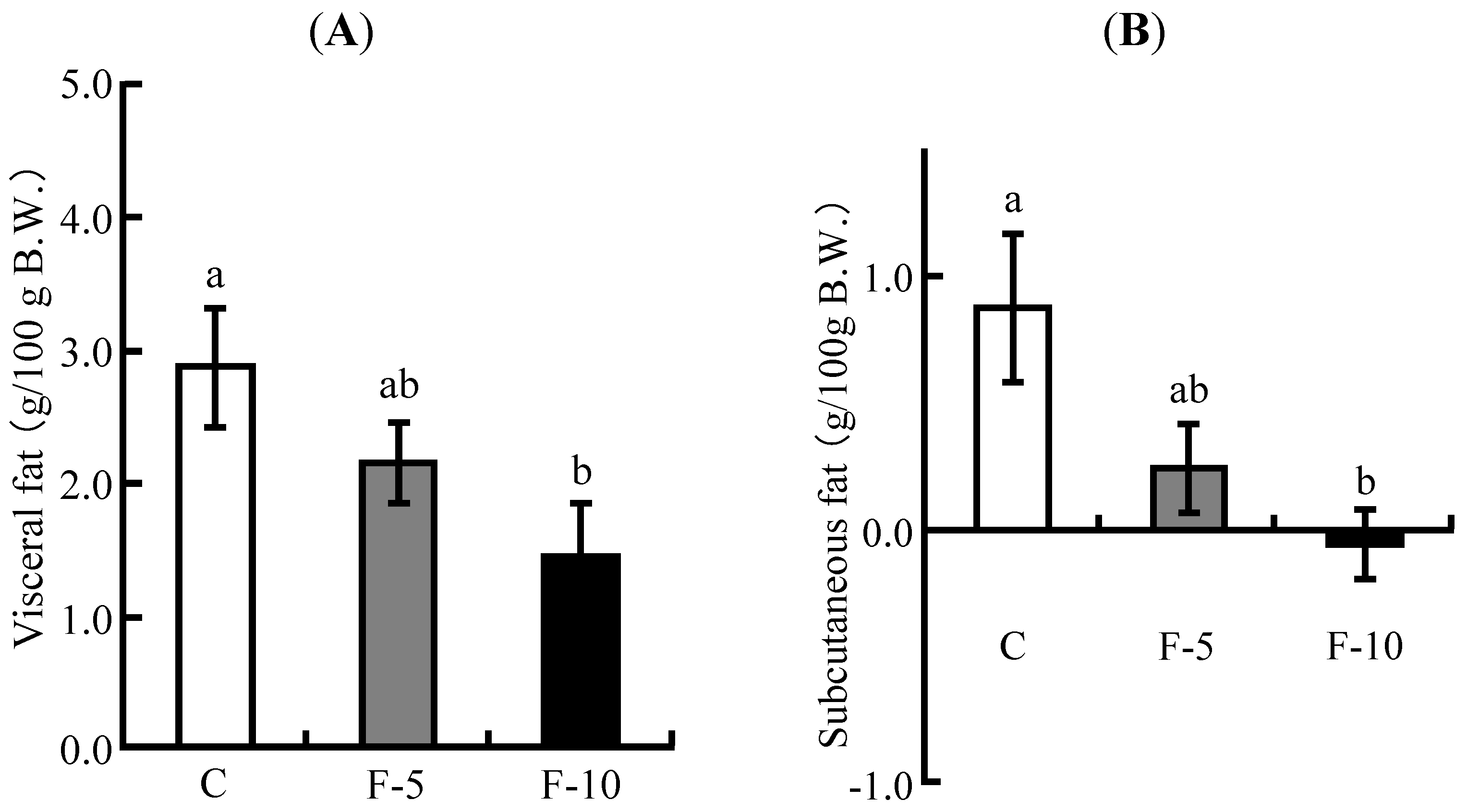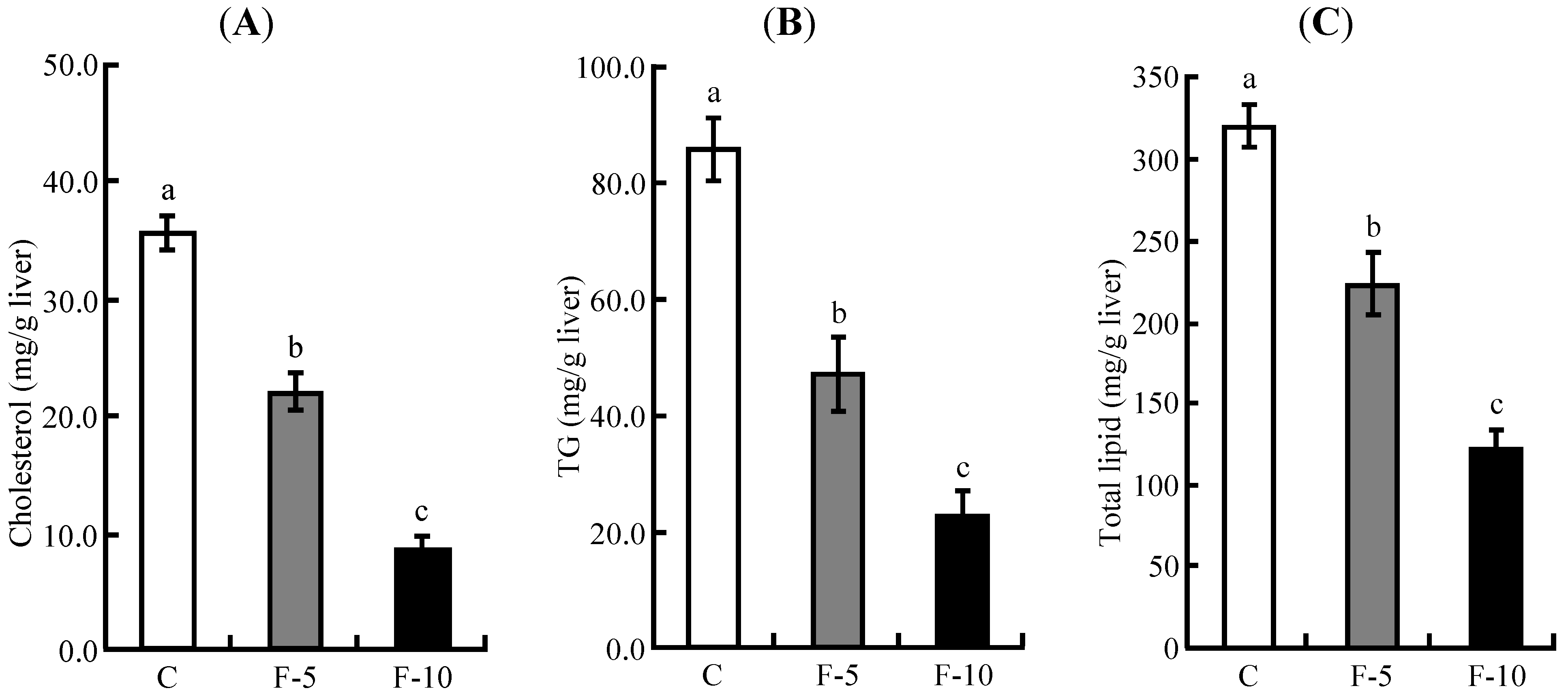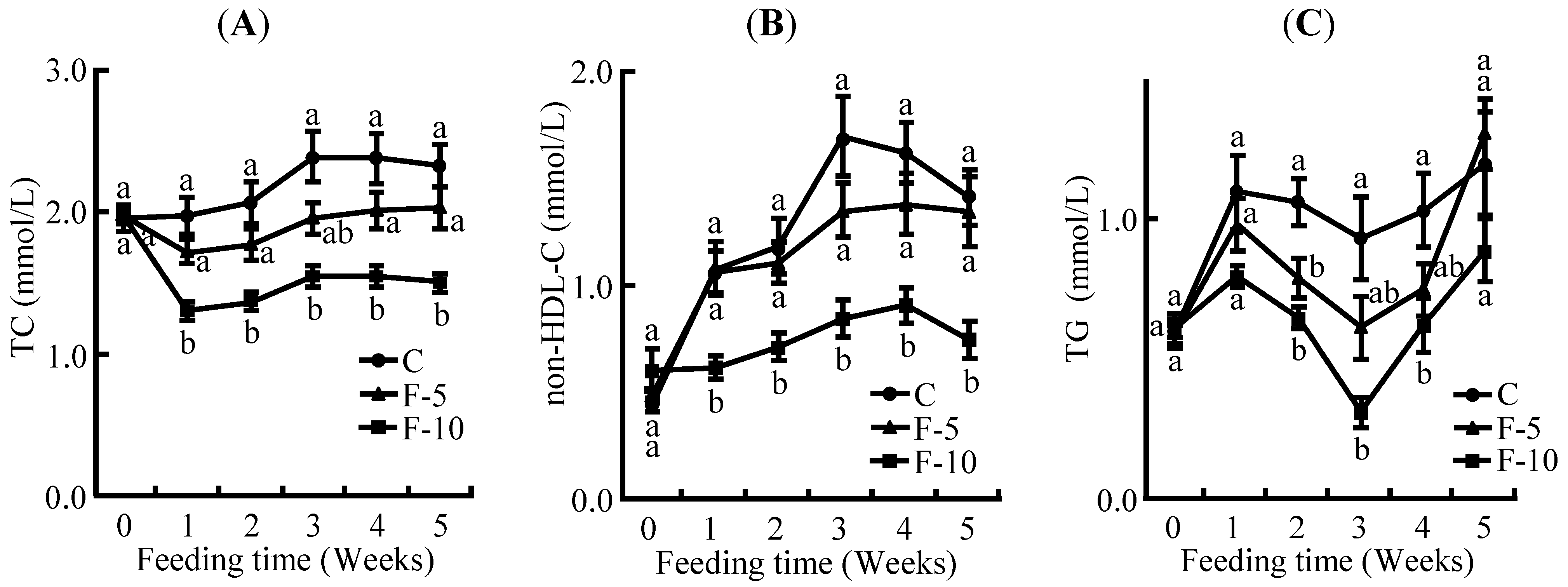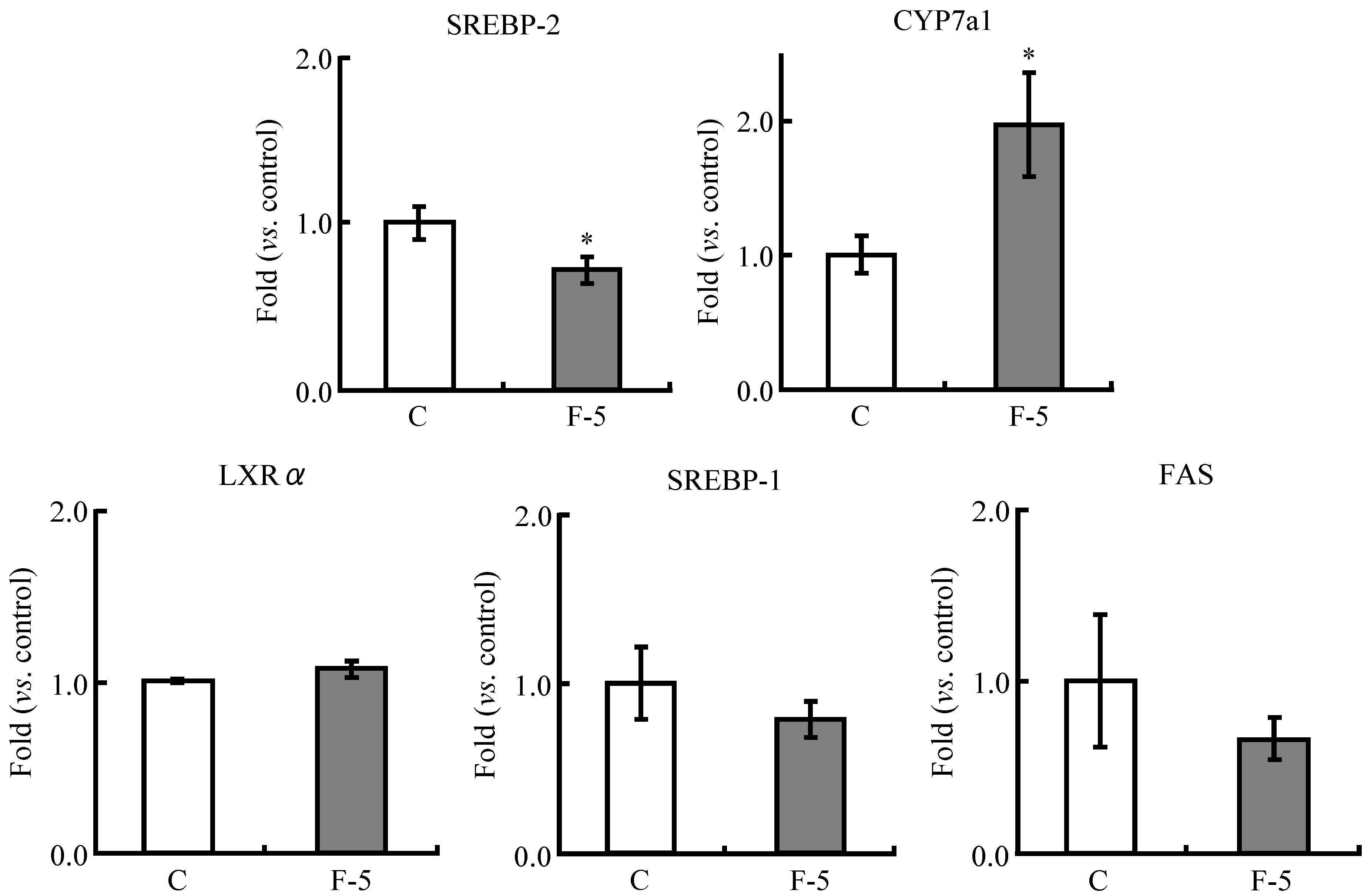Hypocholesterolemic Effects of Lactic Acid-Fermented Soymilk on Rats Fed a High Cholesterol Diet
Abstract
:Abbreviations
| CYP7a1 | cytochrome p450 family 7 subfamily a polypeptide 1 |
| FAS | fatty acid synthase |
| GAPDH | glyceraldehyde-3-phosphate dehydrogenase |
| LXRα | liver X receptor alpha |
| SREBP-1 | sterol regulatory element binding protein 1 |
| SREBP-2 | sterol regulatory element binding protein 2 |
1. Introduction
2. Materials and Methods
2.1. Diets
| Component | Fermented soymilk | |
|---|---|---|
| % | Energy (kcal/100 g) | |
| Water | 4.9 | - |
| Protein | 42.9 | 171.6 |
| Fat | 36.8 | 331.2 |
| Carbohydrate | 2.6 | 10.4 |
| Dietary fiber | 7.2 | 14.4 |
| Minerals | 5.6 | - |
| Total energy | - | 527.6 |
2.2. Animals and Feeding
| Ingredient | Diet group | |||
|---|---|---|---|---|
| AIN-93G * | C | F-5 | F-10 | |
| Casein 1 (%) | 20.0 | 20.0 | 14.2 | 8.4 |
| Cornstarch 1 (%) | 39.8 | 38.8 | 38.1 | 36.5 |
| Dextrinized cornstarch 1 (%) | 13.2 | 13.2 | 13.0 | 12.5 |
| Sucrose 1 (%) | 10.0 | 10.0 | 10.0 | 10.0 |
| Soybean oil 1 (%) | 7.0 | 7.0 | 2.8 | 0.0 |
| Cellulose 1 (%) | 5.0 | 5.0 | 4.1 | 3.2 |
| Mineral mix (AIN-93G-MX) 1 (%) | 3.5 | 3.5 | 3.5 | 3.5 |
| Vitamin mix (AIN-93-VX) 1 (%) | 1.0 | 1.0 | 1.0 | 1.0 |
| L-Cystine 2 (%) | 0.3 | 0.3 | 0.3 | 0.3 |
| Choline bitartrate 3 (%) | 0.25 | 0.25 | 0.25 | 0.25 |
| tert-Butylhydroquinone 2 (%) | 0.0014 | 0.0014 | 0.0014 | 0.0014 |
| Cholesterol 2 (%) | 0.0 | 1.0 | 1.0 | 1.0 |
| Fermented soymilk 4 (%) | 0.0 | 0.0 | 11.7 | 23.4 |
| Total (%) | 100.0 | 100.0 | 100.0 | 100.0 |
| Energy (kcal/100 g) | 372.2 | 368.7 | 366.4 | 371.6 |
2.3. Measurement of the Plasma and Liver Metabolic Parameters
2.4. X-ray Computed Tomography (CT) Analysis
2.5. Real-Time Reverse Transcription-Polymerase Chain Reaction (RT-PCR)
2.6. Statistical Analysis
3. Results
3.1. Body Weight, Food Intake, Food Efficiency, Total Energy Intake and Tissue Weights
| C | F-5 | F-10 | |
|---|---|---|---|
| Initial body weight (g) | 271.7 ± 3.5 a | 269.5 ± 3.4 a | 266.2 ± 2.9 a |
| Final body weight (g) | 422.1 ± 11.6 a | 401.1 ± 15.2 a | 394.9 ± 13.0 a |
| Food intake (g/day) | 19.8 ± 0.7 a | 19.1 ± 0.7 a | 18.3 ± 0.7 a |
| Food efficiency | |||
| (g b.w. gain/g diet) | 0.23 ± 0.01 a | 0.20 ± 0.02 a | 0.21 ± 0.01 a |
| Total energy uptake (kcal) | 2769.7 ± 96.3 a | 2651.9 ± 99.1 a | 2562.4 ± 97.2 a |
| Tissue weight (% b.w.) | |||
| Liver | 4.6 ± 0.1 a | 4.1 ± 0.1 ab | 3.6 ± 0.1 b |
| Cecum | 1.0 ± 0.1a | 1.0 ± 0.1 a | 1.2 ± 0.1 b |
3.2. Visceral Fat and Subcutaneous Fat Masses

3.3. Hepatic Lipid Profile

3.4. Plasma Lipid Profiles
3.5. Real Time PCR Analysis


4. Discussion
5. Conclusions
Implication
Acknowledgments
Conflict of Interest
References
- Napoli, C.; Crudele, V.; Soricelli, A.; Al-Omran, M.; Vitale, N.; Infante, T.; Mancini, F.P. Primary prevention of atherosclerosis: A clinical challenge for the reversal of epigenetic mechanisms? Circulation 2012, 125, 2363–2373. [Google Scholar] [CrossRef]
- Kannel, W.B.; Castelli, W.P.; Gordon, T.; McNamara, P.M. Serum cholesterol, lipoproteins, and the risk of coronary heart disease. Ann. Intern. Med. 1971, 74, 1–12. [Google Scholar]
- Ross, R.; Harker, L. Hyperlipidemia and atherosclerosis. Science 1976, 193, 1094–1100. [Google Scholar]
- Golbitz, P. Traditional soyfoods: Processing and products. J. Nutr. 1995, 125, 570–572. [Google Scholar]
- Carroll, K.K. Review of clinical studies on cholesterol-lowering response to soy protein. J. Am. Diet. Assoc. 1991, 91, 820–827. [Google Scholar]
- Kritchevsky, D. Dietary protein and experimental atherosclerosis. Ann. N. Y. Acad. Sci. 1993, 676, 180–187. [Google Scholar] [CrossRef]
- Sirtori, C.R.; Lovati, M.R.; Manzoni, C.; Monetti, M.; Pazzucconi, F.; Gatti, E. Soy and cholesterol reduction: Clinical experience. J. Nutr. 1995, 125, 598–605. [Google Scholar]
- Sugano, M.; Koba, K. Dietary protein and lipid metabolism: A multifunctional effect. Ann. N. Y. Acad. Sci. 1993, 676, 215–222. [Google Scholar] [CrossRef]
- Lin, Y.; Meijer, G.W.; Vermeer, M.A.; Trautwein, E.A. Soy protein enhances the cholesterol-owering effect of plant sterol esters in cholesterol-fed hamsters. J. Nutr. 2004, 134, 143–148. [Google Scholar]
- Moriyama, T.; Kishimoto, K.; Nagai, K.; Urade, R.; Ogawa, T.; Utsumi, S.; Maruyama, N.; Maebuchi, M. Soybean beta-conglycinin diet suppresses serum triglyceride levels in normal and genetically obese mice by induction of beta-oxidation, downregulation of fatty acid synthase, and inhibition of triglyceride absorption. Biosci. Biotechnol. Biochem. 2004, 68, 352–359. [Google Scholar] [CrossRef]
- Ascencio, C.; Torres, N.; Isoard-Acosta, F.; Gómez-Pérez, F.J.; Hernández-Pando, R.; Tovar, A.R. Soy protein affects serum insulin and hepatic SREBP-1 mRNA and reduces fatty liver in rats. J. Nutr. 2004, 134, 522–529. [Google Scholar]
- Wang, Y.; Jones, P.J.; Ausman, L.M.; Lichtenstein, A.H. Soy protein reduces triglyceride levels and triglyceride fatty acid fractional synthesis rate in hypercholesterolemic subjects. Atherosclerosis 2004, 173, 69–75. [Google Scholar] [CrossRef]
- Taku, K.; Umegaki, K.; Sato, Y.; Taki, Y.; Endoh, K.; Watanabe, S. Soy isoflavones lower serum total and LDL cholesterol in humans: A meta-analysis of 11 randomized controlled trials. Am. J. Clin. Nutr. 2007, 85, 1148–1156. [Google Scholar]
- Demonty, I.; Lamarch, B.; Jones, P.J. Role of isoflavones in the hypocholesterolemic effect of soy. Nutr. Rev. 2003, 61, 189–203. [Google Scholar] [CrossRef]
- Chen, J.R.; Liu, S.M.; Yang, S.C.; Suetsuna, K. Soymilk intake is associated with plasma and liver lipid profiles in rats fed a high-cholesterol diet. Nutrition 2004, 20, 929–933. [Google Scholar] [CrossRef]
- Choi, J.Y.; Jeon, J.E.; Jang, S.Y.; Jeong, Y.J.; Jeon, S.M.; Park, H.J.; Choi, M.S. Differential effects of powdered whole soy milk and its hydrolysate on antiobesity and antihyperlipidemic response to high-fat treatment in C57BL/6N mice. J. Agric. Food. Chem. 2011, 59, 2584–2591. [Google Scholar]
- Kikuchi-Hayakawa, H.; Onodera, N.; Matsubara, S.; Yasuda, E.; Chonan, O.; Takahashi, R.; Ishikawa, F. Effects of soy milk and bifidobacterium fermented soy milk on lipid metabolism in aged ovariectomized rats. Biosci. Biotechnol. Biochem. 1998, 62, 1688–1692. [Google Scholar] [CrossRef]
- Kikuchi-Hayakawa, H.; Onodera, N.; Matsubara, S.; Yasuda, E.; Shimakawa, Y.; Ishikawa, F. Effects of soya milk and Bifidobacterium-fermented soya milk on plasma and liver lipids, and faecal steroids in hamsters fed on a cholesterol-free or cholesterol-enriched diet. Br. J. Nutr. 1998, 79, 97–105. [Google Scholar] [CrossRef]
- Kitawaki, R.; Nishimura, Y.; Takagi, N.; Iwasaki, M.; Tsuzuki, K.; Fukuda, M. Effects of Lactobacillus fermented soymilk and soy yogurt on hepatic lipid accumulation in rats fed a cholesterol-free diet. Biosci. Biotechnol. Biochem. 2009, 73, 1484–1488. [Google Scholar] [CrossRef]
- Kobayashi, M.; Harada, T.; Takagi, N.; Tsuzuki, K.; Sugawara, M.; Fukuda, M. Effects of lactic acid-fermented soymilk on lipid metabolism-related gene expression in rat liver. Biosci. Biotechnol. Biochem. 2012, 76, 19–24. [Google Scholar] [CrossRef]
- Reeves, P.G.; Nielsen, F.H.; Fahey, G.C., Jr. AIN-93 purified diets for laboratory rodents: Final report of the American Institute of Nutrition ad hoc writing committee on the reformulation of the AIN-76A rodent diet. J. Nutr. 1993, 123, 1939–1951. [Google Scholar]
- Folch, J.; Lees, M.; Sloane Stanley, G.H. A simple method for the isolation and purification of total lipids from animal tissues. J. Biol. Chem. 1957, 226, 497–509. [Google Scholar]
- Harada, T.; Tanaka, M.; Tsuzuki, K.; Sugawara, M.; Takagi, N.; Fukuda, M. Effective Dosage of Lactic Fermented Soymilk for Improving Lipid Metabolism in Rats (in Japanese). Nippon Shokuhin Kagaku Kogaku Kaishi 2010, 57, 175–179. [Google Scholar] [CrossRef]
- Tovar, A.R.; Murguia, F.; Cruz, C.; Hernandez-Pando, R.; Aguilar, S.C.A.; Pedraza-Chaverri, J.; Correa-Rotter, R.; Torres, N. A soy protein diet alters hepatic lipid metabolism gene expression and reduces serum lipids and renal fibrogenic cytokines in rats with chronic nephrotic syndrome. J. Nutr. 2002, 132, 2562–2569. [Google Scholar]
- Torres, N.; Torre-Villalvazo, I.; Tovar, A.R. Regulation of lipid metabolism by soy protein and its implication in diseases mediated by lipid disorders. J. Nutr. Biochem. 2006, 17, 365–373. [Google Scholar] [CrossRef]
- Simmen, F.A.; Mercado, C.P.; Zavacki, A.M.; Huang, S.A.; Greenway, A.D.; Kang, P.; Bowman, M.T.; Prior, R.L. Soy protein diet alters expression of hepatic genes regulating fatty acid and thyroid hormone metabolism in the male rat. J. Nutr. Biochem. 2010, 21, 1106–1113. [Google Scholar] [CrossRef]
- Nagata, Y.; Tanaka, K.; Sugano, M. Further studies on the hypocholesterolaemic effect ofsoya-bean protein in rats. Br. J. Nutr. 1981, 45, 233–241. [Google Scholar] [CrossRef]
- Nagaoka, S.; Awano, T.; Nagata, N.; Masaoka, M.; Hori, G.; Hashimoto, K. Serum cholesterol reduction and cholesterol absorption inhibition in Caco-2 cells by a soy protein peptic hydrolyze. Biosci. Biotechnol. Biochem. 1997, 61, 354–356. [Google Scholar] [CrossRef]
- Nagaoka, S.; Miwa, K.; Eto, M.; Kuzuya, Y.; Hori, G. Soy protein peptic hydrolysate with bound phospholipids decreases micellar solubility and cholesterol absorption in rats and Caco-2 cells. J. Nutr. 1999, 129, 1725–1730. [Google Scholar]
- Lucas, E.A.; Khalil, D.A.; Daggy, B.P.; Arjmandi, B.H. Ethanol-extracted soy protein isolate does not modulate serum cholesterol in Golden Syrian hamsters: A model of postmenopausal hypercholesterolemia. J. Nutr. 2001, 131, 211–214. [Google Scholar]
- Han, L.K.; Zheng, Y.N.; Xu, B.J.; Okuda, H.; Kimura, Y. Saponins from platycodi radix ameliorate high fat diet-induced obesity in mice. J. Nutr. 2002, 132, 2241–2245. [Google Scholar]
- Joseph, S.B.; Laffitte, B.A.; Patel, P.H.; Watson, M.A.; Matsukuma, K.E.; Walczak, R.; Collins, J.L.; Osborne, T.F.; Tontonoz, P. Direct and indirect mechanisms for regulation of fatty acid synthase gene expression by liver X receptors. J. Biol. Chem. 2002, 277, 11019–11025. [Google Scholar]
- Myant, N.B.; Mitropoulos, K.A. Cholesterol 7 alpha-hydroxylase. J. Lipid Res. 1977, 18, 135–153. [Google Scholar]
- Chen, J.; Raymond, K. Nuclear receptors, bile-acid detoxification, and cholestasis. Lancet 2006, 367, 454–456. [Google Scholar] [CrossRef]
- Horton, J.D.; Shimomura, I.; Brown, M.S.; Hammer, R.E.; Goldstein, J.L.; Shimano, H. Activation of cholesterol synthesis in preference to fatty acid synthesis in liver and adipose tissue of transgenic mice overproducing sterol regulatory element-binding protein-2. J. Clin. Invest. 1998, 101, 2331–2339. [Google Scholar] [CrossRef]
© 2012 by the authors; licensee MDPI, Basel, Switzerland. This article is an open-access article distributed under the terms and conditions of the Creative Commons Attribution license (http://creativecommons.org/licenses/by/3.0/).
Share and Cite
Kobayashi, M.; Hirahata, R.; Egusa, S.; Fukuda, M. Hypocholesterolemic Effects of Lactic Acid-Fermented Soymilk on Rats Fed a High Cholesterol Diet. Nutrients 2012, 4, 1304-1316. https://doi.org/10.3390/nu4091304
Kobayashi M, Hirahata R, Egusa S, Fukuda M. Hypocholesterolemic Effects of Lactic Acid-Fermented Soymilk on Rats Fed a High Cholesterol Diet. Nutrients. 2012; 4(9):1304-1316. https://doi.org/10.3390/nu4091304
Chicago/Turabian StyleKobayashi, Maki, Rie Hirahata, Shintaro Egusa, and Mitsuru Fukuda. 2012. "Hypocholesterolemic Effects of Lactic Acid-Fermented Soymilk on Rats Fed a High Cholesterol Diet" Nutrients 4, no. 9: 1304-1316. https://doi.org/10.3390/nu4091304
APA StyleKobayashi, M., Hirahata, R., Egusa, S., & Fukuda, M. (2012). Hypocholesterolemic Effects of Lactic Acid-Fermented Soymilk on Rats Fed a High Cholesterol Diet. Nutrients, 4(9), 1304-1316. https://doi.org/10.3390/nu4091304




